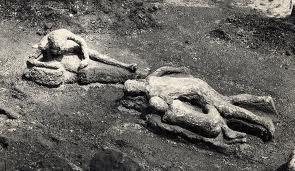The corpses of Orto dei Fuggitivi speak
No bones or shreds of toga,
even less flesh, or blood, or semen:
what’s left of us is the shell
of our corpses in lava, and don’t say
lava saved us: rather condemned us
to eternal sudden death.
You won’t think of us often:
your century wants a culprit
to commemorate the dead.
We remain because our nothingness
remains: there’s the rub.
An image lifted from Judgment Day,
Life meant to imitate Art
by means of the same technique
of imprisoning the human form
with vain aspirations of encrypting the real.
Vapor immobilized us as we tilled
the fields, suspending us
in fixed agony, twice agonic.
Not walking, not sleeping, not fucking—
just tilling the agon. Everything sank
in noise of the end as we entered
the great silence smothered.
Fugitives of the ephemeral,
caught forever in the moment of that agony,
another would capture us better
the sound of certain footsteps in the sea—
the taste of certain lips one portentous afternoon—
the scent of lavender and a gathering storm—
the opportune shadow of an olive tree—
Of our death you know everything,
but of our lives, nothing at all.
You examine us in vain. So obvious,
the moral isn’t worth a metaphor:
in this fire you must be the flame.
*****
My influences as a scientist
My grandfather was a philosopher
whose collected works are titled
simply: Listen, look, and shut it.
My grandmother was a Baroque sculptor
whose masterpiece
was the parlor of her house
where only visitors were permitted.
At the time
I was a mad scientist
in search of a top secret formula.
One day I combined all my chemistry set vials
in a concoction that kept ballooning
even when flushed down the toilet.
Thus did I realize Brueghel
had mislaid a skull in my head.
Due to my failed attempts
to grant long life to impermanence,
my supervisors met in secret
and resolved that from that day forth
nothing would last forever.
In countries with unknown names,
televisions, tenderness, and this
putrid trickle rot together,
suffusing land and sea
with the antibiotic of elegy
****
Martín López-Vega (Poo de Llanes, Asturias, España, 1975) is the author of ten books of poetry in Spanish, collected in Retrovisor: poemas elegidos 1992-2012 (Papeles Mínimos, 2013) and four books of poetry in Asturian, selected in Otra vida: poemas en asturiano (2008). His most recent collection is La eterna cualquiercosa (Pre-Textos, 2014). He has also written a novel, travelogues, and essays on Spanish modernism and Asturian literature. He translates from Portuguese, Italian, and English. In 2000, he received the Roman Prize from the Spanish Academy in Rome. He’s now a PhD student in Spanish at the University of Iowa, where he teaches Portuguese.
Genevieve Arlie is an Arts Fellow at the University of Iowa, where she’ll complete her MFA in literary translation in May 2015. For her thesis she is translating Homo scribens (1994), a chapbook by contemporary Russian poet Dmitry Golynko. She’s the current editor-in-chief of Exchanges, Iowa’s journal of literary translation. Her translations have appeared in The Brooklyn Quarterly and are forthcoming in St. Petersburg Review. Her awards include a Pushkin Poetry Prize, a Stanley Research Grant, and a Kathryn Davis Peace Fellowship. She also holds a BA in English from Stanford and an MA in Russian literature from Columbia.

